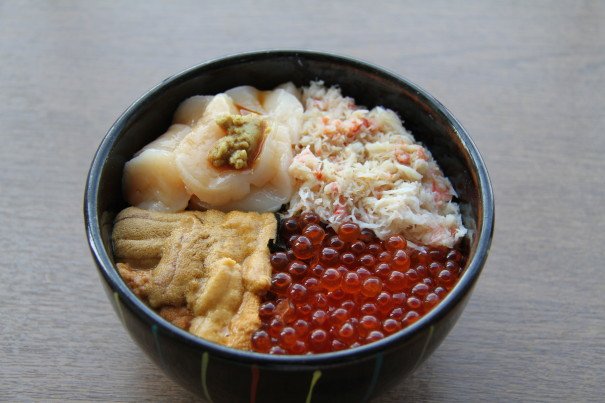
Sea Urchin, Steamed Rice, and the Meaning of the Morning Meal

Sea Urchin, Steamed Rice, and the Meaning of the Morning Meal
Whenever I eat something really special, no matter what time of day, I have this little thing that I do: I nuzzle my jaw into my chest, I raise my shoulders up towards my ears, and I roll my head in swooping circles as if its weight were to much for my neck to support. And then, without warning, I start cursing, unleashing strings of expletives that have no place in decent company. There’s nothing noble or attractive about this habit, but after years spent traveling the world in search of the good stuff, it’s not something I have any particular control over—it just happens.
And so it is that when a small, cautious Japanese woman in a green apron places this beautiful bowl before me, it takes all of 30 seconds before my head starts swiveling and the expletives pollute the airwaves. I have traveled from Tokyo to Hakodate, the southernmost city of Hokkaido, expressly to eat donburi, these heroic combinations of steamed rice and seafood. After scouring the rainbow stalls of the morning market, I settle on Kikuyo Shokudo Honten, a narrow two-story stand offering more than three-dozen combinations of seafood dons. In a matter of a few bites, I’ve forgotten the 8-hour train ride, the tiny hotel room, the cold, wet day that greeted me this morning.
It’s not merely the staggering deliciousness of this particular collection of Hokkaido’s finest seafood—scallops swollen to the size of English muffins, salmon eggs that pop like little depth charges of salt and umami, cat tongues of uni that melt over the warm grains of rice like egg yolk on a carbonara—but the fact that I’m blinking back tears of joy and the sun has barely peeked above the Pacific. I have no business being this happy this early in the morning.
In fact, the more I think about it, the more I realize that this concerning habit of mine surfaces mostly in the hours when the world around me has barely stirred. Not at home, of course, where the rice and crustaceans are replaced with yogurt and cereal; you won’t catch me cursing over corn flakes. When it’s a byproduct of habit and necessity, breakfast can mean so little that many of us skip the meal entirely.
But when I’m on the road, no food has the ability to impact me quite like the morning meal. It starts with the flavors, which, in the best parts of the world, can shake you from your slumber like no cup of coffee ever will: the fermented fish of a Kyoto ryokan, the chile-slathered tortillas of a Oaxaca market stall, the boiled bones and wilted herbs of a Saigon sidewalk kitchen.
But it’s more than a simple matter of taste. The fact is, we are never more vulnerable than at the breakfast table. Our bodies have been in hibernation, our senses have been on airplane mode for the better part of eight hours, and with that first bite, something important about the day in front of us is conveyed through the millions of little taste receptors that light up our brains. If the world is trying to tell us something, now is the moment to listen.
The meaning of its message is different for all of us. For some, it’s the calm before the storm, a moment of peace and contemplation that softens the sharp edges of the day; for others, it is the storm, a full-throated expression of our surroundings and the forces that shape them. We want to taste it all, from the fragrant mohinga and spicy political gossip of a Yangon teahouse to the buttered toast and folded newspaper of a London flat.
That’s why we’ve decided to launch our new Breakfast series, to pay tribute to the meal that moves us most. We’ve reached out to hundreds of our contributors around the world to have them share some of their most memorable breakfasts with us. More than reviews or recommendations, these will be daily mediations on the morning meal—little postcards of time and taste and personal reflection, published just in time to go along with your own breakfast, wherever you may be having it.
I don’t want to promise too much here; not every noodle soup is a revelation, not every breakfast sandwich is an existential gateway. Sometimes a donburi is just a donburi—and that’s worth a few strong words, too.